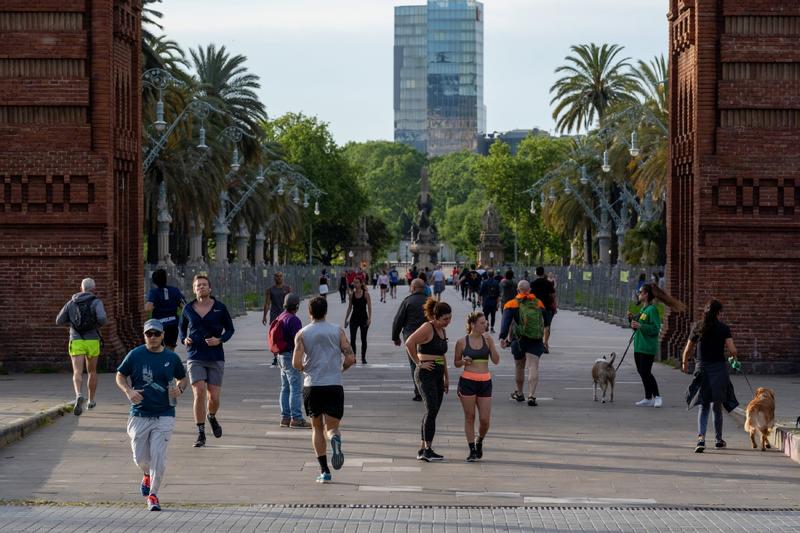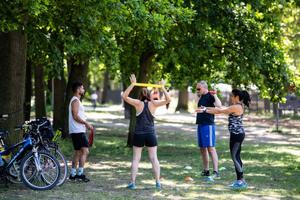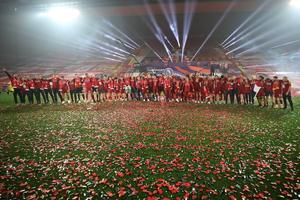Events return with pandemic safeguards in place
 Residents resume exercising in Barcelona, Spain, on May 2 after the government eased lockdown measures. (JOAN GOSA / XINHUA)
Residents resume exercising in Barcelona, Spain, on May 2 after the government eased lockdown measures. (JOAN GOSA / XINHUA)
The return of sports action in Europe during the novel coronavirus pandemic has been tentative and limited in scope.
Professional athletes have been affected by stringent health and safety measures. Fans have mainly been restricted to viewing events on television, while amateur participants have had to adapt to exercising alone, away from regular training partners and teams.
The global response to the crisis prompted an almost total shutdown of competitive sports at all levels, ranging from community and youth leagues to elite events such as the Tokyo Olympics, the Paralympic Games and the Euro 2020 soccer tournament, which have been postponed to next year.
Last month, professional cycling returned. The sport's much-awaited showpiece, the Tour de France, which was delayed in June and July, is set to begin on Saturday and culminate on Sept 20. The race will be a key test of how a major event copes with the new measures.
Tour de France general director Christian Prudhomme hopes the public will be able to watch the race along the route, as is tradition, but with some safeguards in place.
"The Tour de France will be more important than ever," Prudhomme said. "What will be different? The fact that the Tour comes two months later (than scheduled) means there will be fewer people on the side of the road. The publicity caravan won't be as big. There will be fewer people, but the same smiles will be there, and the race will be broadcast on television."
Cycling's governing body, Union Cycliste Internationale, or UCI, has released guidelines to serve as a template for teams, organizers, race officials, the media and fans of men's and women's road racing. The recommendations reflect the challenges faced by most professional sports.
Cycling website VeloNews reported that the general aim is to test everyone before a race, split teams into "bubbles" to maintain social distancing, and "have a working plan in place if someone tests positive for COVID-19".
The sport's officials and race organizers have drawn up a strategy that follows the lead set by health authorities, but also allows for different conditions in different countries, the site said.
David Lappartient, UCI president, said, "These measures remain dependent on the laws and measures in the different host countries and may need to be adapted, but this protocol is another step toward our sport's return to life."
In Europe, professional soccer, cricket and rugby union, along with other high-profile sports such as golf, tennis and snooker, have adapted to the pandemic by operating behind closed doors with extensive safety protocols in place.
 People exercise in a park in Berlin, Germany, on June 3. (ZHANG PING / XINHUA)
People exercise in a park in Berlin, Germany, on June 3. (ZHANG PING / XINHUA)
Seasons prolonged
The English Premier League and other top soccer competitions, including those in Spain and Germany, were allowed to end their seasons in June or last month.
However, leagues in other nations canceled their remaining fixtures. France, which was among the countries to abandon professional matches, took the decision in late April to stop playing games for the rest of the season.
The final stages of the UEFA Champions League and Europa League club competitions were simplified and held this month in a knockout tournament format in Portugal and Germany, respectively. The UEFA Women's Champions League was held with a similar format in Spain.
Popular televised sports, which include lucrative broadcast contracts for organizers, have managed to overcome the worst of the economic impact arising from the pandemic.
The United States saw the return of top-level golf this month, with the PGA Championship in San Francisco, which featured the world's top players, broadcast to a wide audience. The tournament went ahead after the British Open and the Ryder Cup in the US were both canceled.
Golfing boom
Meanwhile, there has been a surge in the number of amateur golfers. In the UK, the number of rounds played last month was up by more than 40 percent compared with the same period last year, according to preliminary figures published by Sports Marketing Surveys.
Golf Magic, a news site dedicated to the sport, said that for many people "golf has been a key social outlet, as well as a way of preserving mental and physical health through the pandemic".
Professional snooker has experienced relative success since returning. Ronnie O'Sullivan from the United Kingdom won his sixth World Snooker Championship title this month, with the final against Kyren Wilson played in front of a reduced crowd of about 300 at the Crucible Theatre in Sheffield, northern England.
It was one of the first major events held in Europe during the pandemic that fans were allowed to attend, although the vast majority of the tournament was played without an audience. Organizers said the TV viewing figures were high and included huge numbers of fans in China.
Track and field is also returning after experiencing a major blow when the 2020 European Athletics Championship was canceled. Due to be staged in Paris from Tuesday to Sunday, the event was an early casualty of the lockdown imposed in the French capital.
 The Liverpool squad pose behind the Premier League trophy during the presentation following the English Premier League football match between Liverpool and Chelsea at Anfield in Liverpool, north west England on July 22, 2020. (PHIL NOBLE / POOL / AFP)
The Liverpool squad pose behind the Premier League trophy during the presentation following the English Premier League football match between Liverpool and Chelsea at Anfield in Liverpool, north west England on July 22, 2020. (PHIL NOBLE / POOL / AFP)
On Aug 15, the Diamond League, the elite track and field competition, returned behind closed doors in Monaco, four months later than originally scheduled.
Swimming has been hit by the pandemic at elite and recreational level, with the 2020 European Aquatics Championships, scheduled for May 11 to May 24 in Budapest, Hungary, postponed to next year. Swimming pools that have reopened across Europe have imposed strict precautionary measures.
Mass-participation events aimed at attracting amateur competitors, such as marathons, triathlons and other outdoor endurance competitions, had to be called off, resulting in lost income from entry fees.
By early March, with the pandemic triggering lockdowns across Europe, organizers of popular marathons in many cities slowly began to accept the harsh reality of the situation and postponed their races.
One of the biggest events, the Paris Marathon, originally due to take place on April 5, was postponed until Oct 18, then to Nov 15, before being canceled. Marathons scheduled for Rome, Barcelona, Madrid and Frankfurt were initially postponed before being called off.
Of the six World Marathon Majors, the events in Berlin, Chicago, New York and Boston were canceled, while the Tokyo marathon was held in March, with only elite athletes competing.
The London Marathon, originally due to be held on April 26, is now scheduled for October, but only with elite athletes. Next year's event in the UK capital has also been moved from April to October. The BBC reported that the loss of amateur participants from the London Marathon is also a huge blow for charities, with last year's event raising more than 66 million pounds (US$86 million).
Organizers of the London Marathon announced this month that the elite races for male, female and wheelchair athletes had been rescheduled for an enclosed course in St James's Park on Oct 4, with finishing times counting toward qualification for the postponed Tokyo 2020 Olympic event.
Huge losses incurred
Despite the introduction of stringent testing and unprecedented safety measures, sports in Europe and worldwide clearly still face huge repercussions from the pandemic.
Sports federations and event organizers have been severely affected by lockdowns, while cancelations have resulted in huge economic losses.
Dan Parnell, senior lecturer in sport business at the University of Liverpool Management School in the UK, makes key notes on sports and the pandemic in articles titled "COVID-19, Networks and Sport". The notes appear in the journal Managing Sport and Leisure, and the articles are shared online.
"The networked nature of the global sport industry and its associated events program, which brings together athletes, employees and fans, only serves to heighten the potential threat of a sustained global spread (of the pandemic)," according to Parnell, who has a doctorate in his field.
He cited a 2015 World Health Organization publication that warned of global pandemics presenting "challenges that cut to the very core of our processes and decision-making for political, economic and social institutions, with no stronger example than mass gatherings and sporting events".
Parnell added, "Human beings are inherently social, and gatherings are symbolic, embodied, loaded with cultural meanings."
He cited the Euro 2020 soccer tournament-among the major sports events originally planned for this summer that have been postponed until next year.
"Euro 2020 was uniquely designed. It demonstrated the cultural togetherness and fluidity of the eurozone, spanning 12 countries to mark 60 years of competition," he said. "The tournament also celebrates the network society of modern Europe and the virtues of the European Union-especially of movement."
He added that qualifying matches for the finals have been held in cities across the continent.
This collaborative approach has been welcomed by economics scholars and commentators, who in the past have provided evidence pointing toward poor investment returns associated with hosting major sports events. This new multicity approach will reduce the financial risk and poor return on investment for the selected host, Parnell said.
"Yet, it is this networked strength that has proven Euro 2020's Achilles heel," he concluded.
jonathan@mail.chinadailyuk.com


